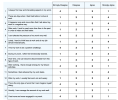Long COVID and its associations with burnout, anxiety, and depression among U. S. healthcare workers in the United States
BACKGROUND
Data on Long COVID and its associations with burnout, anxiety and depression among healthcare workers (HCW) in the United States (U. S.) is limited.
METHODS
This study utilized cross-sectional data from the final survey conducted in July 2023, which was part of a longitudinal cohort study assessing COVID-19-related burnout and wellbeing among healthcare workers (HCWs) in a large tertiary academic healthcare system in the Chicago area. The survey included questions on self-reported Long COVID status, as well as the Oldenburg Burnout Inventory (OLBI) to measure burnout and the Patient-Reported Outcomes Measurement Information System (PROMIS) computer adaptive tests (CAT) to assess anxiety and depression. A total of 1,979 HCWs participated in the survey, yielding a response rate of 56.1%.
RESULTS
The analysis included 1,678 respondents with complete data, of whom 1,171 (70%) self-reported having had COVID-19. Of these, 90 (7.7%) reported Long COVID, with 53% indicating that their most bothersome symptoms persisted for more than 6 months, while 50% reported no longer experiencing those symptoms at the time of the survey. Multivariable linear regression analyses revealed that Long COVID was significantly associated with higher OLBI scores (β = 2.20, p = 0.004), PROMIS anxiety scores (β = 2.64, p = 0.001) and PROMIS depression scores (β = 1.98, p = 0.011) compared to those who had COVID-19 but not Long COVID. Similar patterns of associations were observed when comparing the Long COVID group to those who never had COVID-19. No significant differences were found between those who never had COVID-19 and those who had COVID-19 without developing Long COVID.
CONCLUSION
Long COVID was associated with higher levels of burnout, depression, and anxiety among healthcare workers compared to those who had COVID-19 alone or were never infected, despite its lower prevalence during the endemic phase. These findings underscore the need for continued prevention efforts and targeted support strategies in healthcare settings.
Web | PDF | Frontiers in Public Health | Open Access
Vu, Thanh-Huyen T. ; Hua, Miao Jenny ; Dubois, Cerina ; Moskowitz, Judith T. ; Wallia, Amisha ; Hirschhorn, Lisa R. ; Wilkins, John T. ; Evans, Charlesnika T.
BACKGROUND
Data on Long COVID and its associations with burnout, anxiety and depression among healthcare workers (HCW) in the United States (U. S.) is limited.
METHODS
This study utilized cross-sectional data from the final survey conducted in July 2023, which was part of a longitudinal cohort study assessing COVID-19-related burnout and wellbeing among healthcare workers (HCWs) in a large tertiary academic healthcare system in the Chicago area. The survey included questions on self-reported Long COVID status, as well as the Oldenburg Burnout Inventory (OLBI) to measure burnout and the Patient-Reported Outcomes Measurement Information System (PROMIS) computer adaptive tests (CAT) to assess anxiety and depression. A total of 1,979 HCWs participated in the survey, yielding a response rate of 56.1%.
RESULTS
The analysis included 1,678 respondents with complete data, of whom 1,171 (70%) self-reported having had COVID-19. Of these, 90 (7.7%) reported Long COVID, with 53% indicating that their most bothersome symptoms persisted for more than 6 months, while 50% reported no longer experiencing those symptoms at the time of the survey. Multivariable linear regression analyses revealed that Long COVID was significantly associated with higher OLBI scores (β = 2.20, p = 0.004), PROMIS anxiety scores (β = 2.64, p = 0.001) and PROMIS depression scores (β = 1.98, p = 0.011) compared to those who had COVID-19 but not Long COVID. Similar patterns of associations were observed when comparing the Long COVID group to those who never had COVID-19. No significant differences were found between those who never had COVID-19 and those who had COVID-19 without developing Long COVID.
CONCLUSION
Long COVID was associated with higher levels of burnout, depression, and anxiety among healthcare workers compared to those who had COVID-19 alone or were never infected, despite its lower prevalence during the endemic phase. These findings underscore the need for continued prevention efforts and targeted support strategies in healthcare settings.
Web | PDF | Frontiers in Public Health | Open Access

